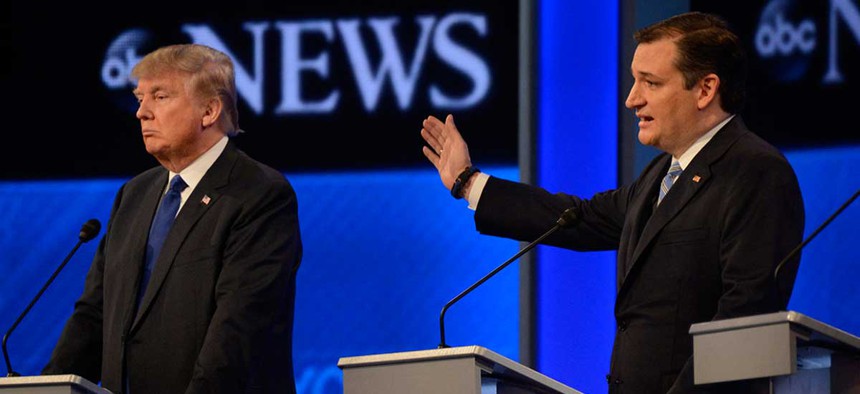
Ida Mae Astute/ABC
The Lesser of Three Evils
Trump, Cruz, and Clinton would be their parties’ most disliked nominees in the history of polling.
Reality-check time: Donald Trump’s resounding victory in his home state of New York didn’t significantly alter his prospects for winning the necessary delegates before the Cleveland convention. He won 89 out of 95 delegates in his home state, not many more than expected. He’s still on pace to finish short of 1,237 delegates—and will need a surprising victory in Indiana or a resounding finish in California to alter that trajectory.
The haphazard scheduling of the calendar will likely create a false sense of momentum for both of the GOP front-runners. Trump will enter May with a hot streak if he sweeps the five Northeastern states (Connecticut, Delaware, Maryland, Pennsylvania, Rhode Island) holding primaries Tuesday. That doesn’t mean he’ll be closer to clinching. In May, as the calendar heads west, Ted Cruz is well-positioned to win four of the five next contests. The only way the race will tip in one candidate’s favor is if there’s a true upset—for example, Trump losing Maryland or Cruz losing Indiana.
Cruz has failed to expand his appeal beyond his core base of conservative and evangelical supporters. His distant third-place finish in New York and expected weak showings throughout the Northeast underscore his campaign’s limitations. He’s not picking up Hill endorsements. But Trump also needs to show that he can win the majority of GOP voters in a state outside his comfort zone. His 60 percent showing in New York was the first time he’s won a majority in any state. That’s an important accomplishment, but it’s tempered by: a) his home-state advantage, b) few of New York’s registered voters are Republicans; c) the anti-Trump opposition held its fire because of the prohibitive cost of New York City advertising.
It’s worth paying close attention to the results from the Pennsylvania primary. Since 54 of the state’s 71 delegates are unpledged, it’s not likely to make a notable difference in the delegate count. But Trump could at least show he’s broadened his appeal by performing respectably in the moderate, affluent Philadelphia suburbs. Pennsylvania may also underscore John Kasich’s limitations. On paper, he holds the potential to do well in the western part of the state (he was raised in a Pittsburgh suburb) and in eastern regions (his centrist message is pitch-perfect for suburban Philadelphia voters). But his campaign’s lack of money and scattershot scheduling means his best-case scenario is a distant second.
Our back-of-the-envelope estimate has Trump with 1,160 delegates going into Cleveland, 77 short of the magic number. The problem for the anti-Trump forces is that his two GOP competitors are limping to the finish line as well. If the stalemate holds, the chances of an outside candidate emerging at the convention grow ever greater.
TRAIL MIX
1. In a story detailing the Republican National Committee’s fundraising challenges in a Trump-dominated universe, New York Times reporter Jonathan Martin revealed that the RNC is planning to create a fund that is specifically intended for Senate races—so donors looking to support down-ballot Republicans can do so without seeming to support Trump. One problem: The National Republican Senatorial Committee is the typical vehicle for such fundraising. That creates the potential for serious intraparty conflict.
Asked about the RNC’s newfound engagement in Senate races, a senior NRSC official told National Journal: “This is the first I’ve heard of anything like this. Nobody has talked with me about this.” Expect more intraparty conflict like this to come, especially if Trump emerges as the party’s standard bearer.
2. Chatter about Elizabeth Warren becoming Hillary Clinton’s running mate hit fever pitch last week. But if Clinton still needs to placate her party’s progressive, pro-Sanders wing even after clinching the nomination, it would be a sign of weakness as she moves into the general election. She’s got a golden opportunity to use her selection to win over the center, given that Republicans are most likely to nominate either Cruz or Trump. Picking Warren would be the equivalent of Cruz selecting Trump to unify the GOP’s antiestablishment wing.
The Clinton running mate recruit to watch? Virginia Sen. Tim Kaine, a swing-state Catholic who is well-respected on both sides of the aisle. It doesn’t hurt that he was a finalist to be Obama’s running mate in 2008 as well. Clinton could use a Hispanic or African-American running mate, but the pickings are surprisingly slim in her party. HUD Secretary Julian Castro, Sen. Cory Booker of New Jersey, and Labor Secretary Tom Perez are the most-mentioned names, but none have the resume for the second-highest office in the country.
3. The major takeaway from this month’s NBC/Wall Street Journal pollwas that Trump, Clinton, and Cruz would be the three most disliked candidates to emerge as their party’s nominee in the history of polling. But there were some other nuggets from the poll that illustrated the polarization in American politics.
First, the number of Americans believing the country is headed in the wrong direction hit 70 percent—the highest level since August 2014. The country is deeply divided on President Obama’s performance: 49 percent approve, 48 percent disapprove. Most of those who disapprove are strongly against him. But only 13 percent of respondents feel “very positively” towards Clinton, while Obama’s very-positive score is more than twice that (28 percent).
Second, despite the Republican party’s battered brand, both parties are close to parity on a generic presidential ballot. Forty-six percent of registered voters said they’d prefer to see a Democrat as the next president, while 45 percent said they’d vote for a Republican. But over one-third of Republican voters said they couldn’t support either Trump (38 percent) or Cruz (35 percent). Only 21 percent of Democrats said they couldn’t support Clinton.
Finally, the poll confirmed that the identity of the GOP nominee will go a long way in determining the competitiveness of the general election. Against Trump, Clinton leads by 11 percentage points, 50-39. Against Cruz, she leads by only two points, 46-44. And against Kasich, Clinton trails by a double-digit margin, 51-39. (In a hypothetical matchup, Paul Ryan would lead Clinton by 1 point—a sign that Cruz is not significantly less electable than the establishment’s favored son.) Clinton looks like the weakest Democratic nominee since Michael Dukakis in 1988. The main question for Republicans is whether they’ll put a cupcake in the ring with her.
NEXT STORY: A Vice Presidential Free-for-All?







